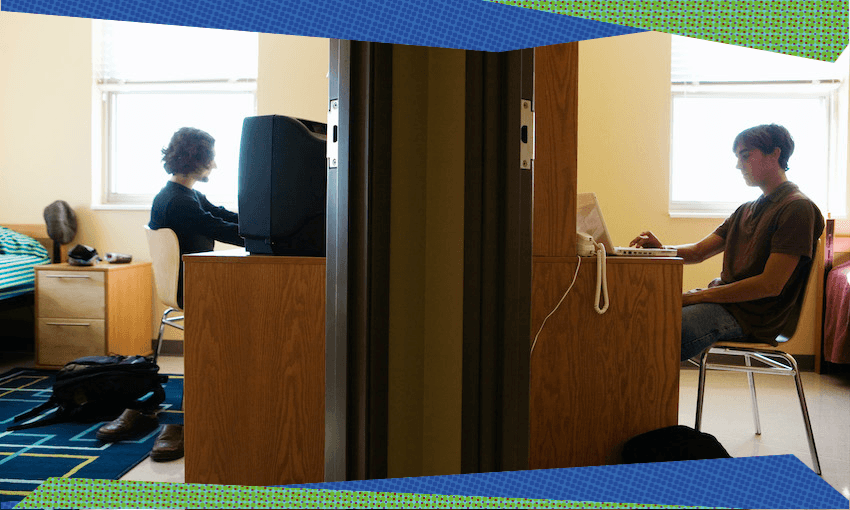Opponents say a contract change will leave residential advisers – students who look after their peers in university halls – struggling to get by.
Residential advisers (RAs), students who look after their peers while attempting to maintain their grades, are integral parts of university communities. Being an RA is a paid job for tauira with guaranteed housing within university halls of residences. Halls typically provide students with decent housing, albeit in a shoebox package, within walking distance of campus.
Our biggest tertiary institution, Waipapa Taumata Rau/University of Auckland, houses 4,400 tauira across 10 halls, with ambitious plans to expand the service to 7,500 total students by 2026. Waipapa Taumata Rau RAs are busy looking after those thousands of residents, each supervising 35, 38, 40 or 50 residents.
During 2023, RAs at Waipapa Taumata Rau were on fixed-term contracts for 15 hours a week. They received the minimum hourly wage for those 15 hours plus any after-hours work they did, as well as an allowance for being on call after hours. They also received a 25% discount on accommodation in the hall in which they worked. But with the 2023 university year ending, prospective RAs are being offered their contracts for 2024, and these have come with several unexpected changes.
Not all the changes are unwelcome. The university is raising the wage for RAs from the current minimum wage of $22.70 to the living wage of $26.25, for example. Another important change is RAs being replaced by full-time staff outside of daytime working hours, which came about after RAs raised issues about the toll of after-hours work. “Through those discussions, we have concluded that we can no longer ask our RAs, who are first and foremost students, to risk compromising their own wellbeing by being on-call after hours,” a Waipapa Taumata Rau spokesperson said via email. “The frequency and severity of mental health issues has been steadily increasing for many years now, and dealing with these incidents can be very distressing.” Even non-distressing callouts disrupted sleep, which has had an impact on RAs’ academic success. At an October rally outside the vice-chancellor’s office, one student, Poppy, spoke from experience about how grades slip when tauira must work to cover hall rent.
But one contractual change in particular has angered student groups: the 25% RA rent reduction has been axed. The discount was already less than what other local and international universities offered RAs, said Matthew Lee, chair of Students for Fair Rent, a group advocating for RAs and residents that organised the rally. “RAs in many universities in the United States don’t even have to pay rent. It’s disappointing that in a country where we consider ourselves to be more progressive and protective of workers’ rights, RAs are completely mistreated by their employers,” Lee said.
Even with the rent reduction, the RA pay on its own has not been enough to cover it – something raised at the October rally, with one RA complaining that “all of the labour I give to the uni doesn’t even cover my rent”. Lee said that even when combining paid work and a student allowance or loan, RAs struggled to afford “to live at the place they are required to live at”.
Students for Fair Rent, Working Students Aotearoa, the Auckland University Student Association and local Auckland Central MP Chlöe Swarbrick have called for RAs to either turn the contract down or delay accepting it until more favourable conditions have been negotiated.
But Auckland University says the contractual changes reflect the change in RAs’ roles, which will allow them to focus on community building rather than after-hours pastoral care. “The remuneration package will reflect that smaller, though still critical role, with 15 hours paid (at living wage rates). We believe this remuneration package is appropriate to the work being asked of RAs,” said the spokesperson.
But Lee of Students for Fair Rent said that after the removal of the rent reduction, and paired with the on-average 8% rent increase at all Waipapa Taumata Rau halls coming next year, the rise in the wage was negligible. A Students for Fair Rent petition said the increase “makes the University of Auckland Halls of Residence the most expensive student accommodation in the country and is far above the market rate in Auckland Central”.
Amid the rent increases, some tauira are looking for alternatives. Catherine, a Carlaw Park Student Village resident, spoke at the rally, detailing how she had to work 20 hours a week to afford Carlaw, leaving her with “no social life and stress and anxiety about the situation”. She can’t afford the increased rent next year, and is considering moving to Australia to study.
Since the rally, Waipapa Taumata Rau has formally responded to Students for Fair Rent’s petition for fairer rent, which attracted around 1,500 signatories, and Lee said that he and fellow student campaigners “expect to enter into discussions with the university regarding both the rent and RA issues”.
“RAs are not just part-time employees at the university,” said Lee. “They are full-time caregivers of residents at student accommodation, and should be given the dignity of such a role. It is disappointing that the university has, once again, decided to prioritise profits over students.”
This is Public Interest Journalism supported by NZ On Air.



